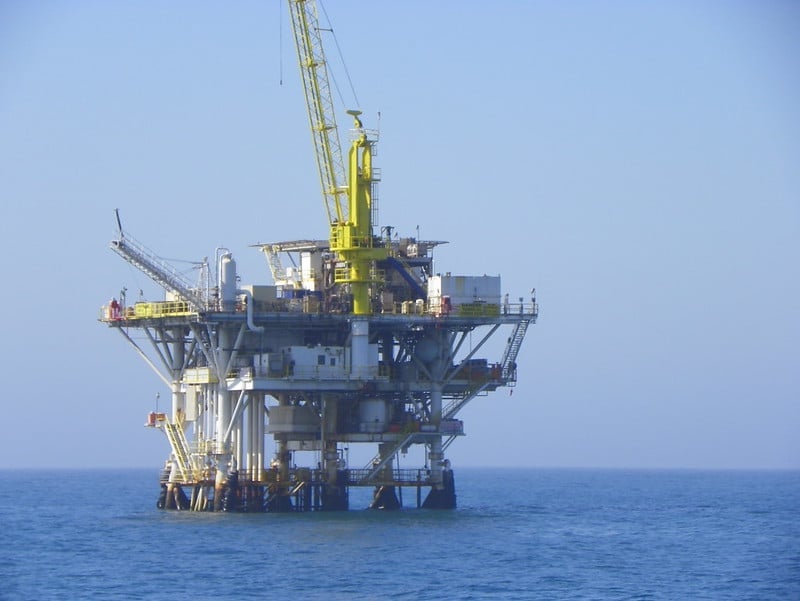
Gas Exploration in Crete, Greece / Credit: Flickr, Stephen Conn CC BY NC 2-0
Greece is cautiously advancing on two major energy fronts in the Mediterranean, weighing the potential for significant breakthroughs against the risk of setbacks.
While the government is expanding investment in renewable energy, such as wind and solar, it is also moving forward with oil and gas exploration in contested waters.
The stakes are high—not only for the country’s energy independence but also for its standing in the geopolitical chessboard of the Eastern Mediterranean.
Hydrocarbon Exploration Near Southern Crete
The most pressing development concerns hydrocarbon exploration south and southwest of Crete, where Athens hopes to attract at least one major American energy company to participate. On September 10–11, the deadline will close for bids on two offshore blocks, with Greece expecting interest from Chevron, ExxonMobil, or both, in partnership with Hellenic Energy.
Greek officials view US participation as critical. If Chevron or ExxonMobil submit bids, it would mark a diplomatic and strategic win for Athens, strengthening its position against Ankara’s maritime claims. If no American companies step forward, however, it could derail plans that have been more than 15 years in preparation.
Turkey’s Claims and the Libya Memorandum
Turkey continues to contest Greece’s rights in the region, invoking a controversial 2019 maritime agreement with Libya’s Tripoli-based government that divides large swaths of the Eastern Mediterranean between them. The deal, rejected as illegal by most countries, asserts that islands such as Crete lack their own continental shelf—a position Greece and the European Union firmly dispute.
Both Athens and Ankara are vying for influence in Libya. Greece has intensified contacts with Marshal Khalifa Haftar, the military leader who controls eastern Libya, while Turkey has stepped up its engagement with Tripoli and sent senior officials to secure support for its maritime claims.
Adding another layer to the diplomatic maneuvering, Greece is preparing to host Belkacem Haftar, the marshal’s son, for talks on infrastructure projects. Meanwhile, Tripoli’s acting foreign minister, Taher Al-Baour, is scheduled to visit Athens on September 15 to explore the possibility of maritime delimitation talks, despite the stalemate caused by the Turkish-Libyan memorandum.
Strategic Value of US Involvement
Greek Foreign Minister Giorgos Gerapetritis described potential US company participation in Crete’s exploration projects as a “major success for Greek diplomacy.” Analysts suggest that American involvement could act as a deterrent to Turkish interference, though uncertainty remains given Washington’s delicate balancing act between its NATO allies.
Upcoming diplomatic engagements could prove decisive. US Secretary of Energy Chris Wright is expected in Athens, while Gerapetritis is scheduled to meet US Secretary of State Marco Rubio during the UN General Assembly in New York. Both meetings are expected to focus heavily on energy cooperation and maritime security.
The Great Sea Interconnector Stalls
Alongside hydrocarbon exploration, Greece has also been promoting the Great Sea Interconnector, a planned electricity cable linking Greece, Cyprus, and Israel.
However, the project is now in jeopardy after Cyprus raised new concerns over its viability. The initiative had been touted as a step toward regional energy integration, but with mounting political and financial hurdles, its future remains uncertain.
The Road Ahead for Greek Energy Strategy
For Athens, the coming weeks will be pivotal. Success in attracting US energy giants to Crete could boost Greece’s energy security, deliver new revenue streams, and reinforce its claims in the Eastern Mediterranean. Failure to secure participation, however, risks undermining long-term strategy and emboldening Ankara.
Caught between renewable ambitions, fossil fuel exploration, and regional rivalries, Greece is navigating a delicate balance. Whether it emerges with tangible energy gains or renewed diplomatic challenges will depend on the decisions made this month—both in Athens and in Washington.